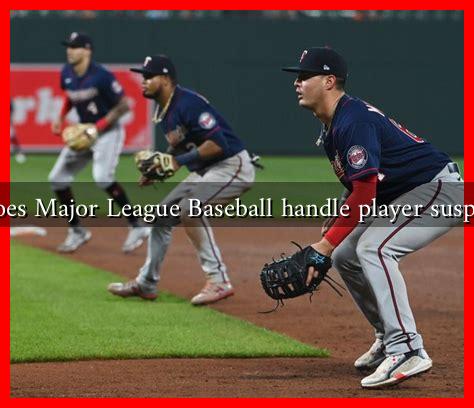-
Table of Contents
How Does Major League Baseball Handle Player Suspensions?
Major League Baseball (MLB) is not just a game of skill and strategy; it also involves strict regulations and disciplinary measures to maintain the integrity of the sport. Player suspensions are a critical aspect of this regulatory framework, addressing issues ranging from performance-enhancing drugs to on-field misconduct. This article delves into how MLB manages player suspensions, the processes involved, and notable examples that have shaped its policies.
The Framework of Player Suspensions
MLB’s approach to player suspensions is governed by a combination of collective bargaining agreements, league rules, and specific policies related to various infractions. The primary sources of these regulations include:
- Collective Bargaining Agreement (CBA): This is a contract between MLB and the Major League Baseball Players Association (MLBPA) that outlines the rights and responsibilities of players and the league.
- Drug Policy: MLB has a comprehensive drug policy that includes testing for performance-enhancing drugs (PEDs) and recreational substances.
- Code of Conduct: This includes rules regarding player behavior, including violence, harassment, and other forms of misconduct.
Types of Suspensions
Player suspensions in MLB can be categorized into several types, each with its own set of rules and consequences:
- Performance-Enhancing Drug Violations: Players found using PEDs face suspensions that can range from 80 games for a first offense to a lifetime ban for repeated violations.
- Domestic Violence Policy: Under MLB’s domestic violence policy, players can be suspended for up to 80 games for a first offense, with potential for longer suspensions based on the severity of the incident.
- On-Field Conduct: Suspensions can also arise from actions during games, such as fighting or using inappropriate language. These suspensions are typically shorter, often ranging from a few games to several weeks.
The Suspension Process
The process for handling player suspensions is systematic and involves several key steps:
- Investigation: When an infraction is reported, MLB conducts a thorough investigation, which may involve interviews, reviewing evidence, and consulting with legal experts.
- Decision: After the investigation, MLB makes a determination regarding the appropriate disciplinary action.
. This decision is communicated to the player and the public.
- Appeal Process: Players have the right to appeal their suspensions. An independent arbitrator reviews the case, and their decision is final.
Notable Cases and Their Impact
Several high-profile cases have highlighted MLB’s approach to suspensions:
- Alex Rodriguez (2014): A-Rod received a 211-game suspension for his involvement in the Biogenesis scandal, which involved the use of PEDs. This case was significant as it marked one of the longest suspensions in MLB history.
- Roberto Osuna (2018): The Toronto Blue Jays closer was suspended for 75 games under MLB’s domestic violence policy, setting a precedent for how the league handles such serious allegations.
- Trevor Bauer (2021): Bauer was placed on administrative leave amid allegations of sexual assault, which later led to a two-year suspension. This case underscored MLB’s commitment to addressing off-field misconduct.
Statistics and Trends
According to MLB’s annual reports, the number of suspensions related to PEDs has decreased significantly since the implementation of stricter testing protocols in 2014. In 2013, there were 12 suspensions for PED violations, while in 2022, that number dropped to just 3. This trend indicates that the league’s efforts to combat drug use are having a positive effect.
Conclusion
Major League Baseball’s handling of player suspensions is a complex but essential aspect of maintaining the sport’s integrity. Through a structured framework that includes various types of suspensions, a clear process for investigation and appeals, and notable cases that have shaped its policies, MLB demonstrates its commitment to fair play and accountability. As the league continues to evolve, it will be crucial to monitor how these policies adapt to new challenges in the ever-changing landscape of professional sports.
For more information on MLB’s policies and player conduct, you can visit the official MLB website at mlb.com.





